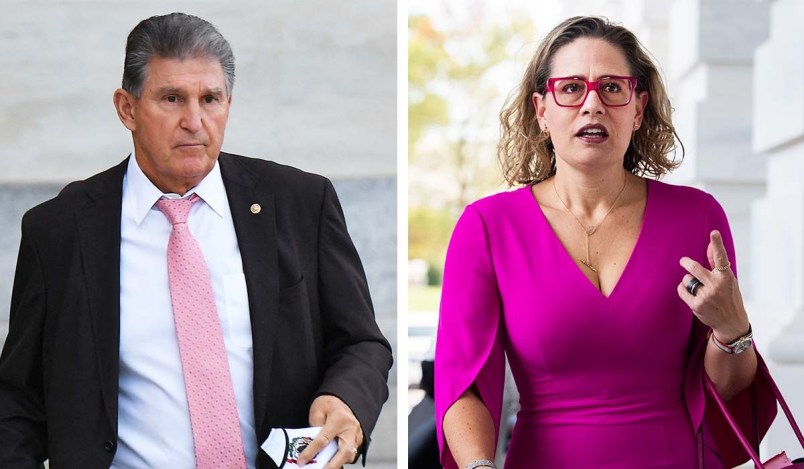While negotiations over the reconciliation bill continue at an agonizingly slow pace, some major pieces fell into place this week.
The number of outstanding issues has dropped precipitously. The biggest loose end as of Friday was fierce negotiations over the Medicare prescription drug negotiation proposal. Sen. Chris Murphy (D-CT) told reporters at the end of the day Thursday that the White House and Sen. Kyrsten Sinema (D-AZ) had arrived at an agreement that didn’t make its way into the framework, but that lawmakers including Sens. Bernie Sanders (I-VT) and Elizabeth Warren (D-MA) were pushing to make the proposal stronger.
House progressives enthusiastically endorsed the framework, despite the fact that some were bitterly disappointed that certain programs were not included. They promised their votes when there’s legislative text, and when they have assurances — from President Joe Biden, or from public statements — that all 50 senators are on board with it.
Biden expressed confidence to House Democrats during a Thursday morning caucus meeting that the framework would get the support of all the Senate Democrats.
So why won’t Sinema and Sen. Joe Manchin (D-WV) endorse it?
There’s been some weird dancing around the fact that both of them have been given ample opportunity to state clearly whether or not they support the framework, and are instead choosing to occupy a purposefully vague middle ground.
“Having spoken to both of them in person within the last two hours, neither of them sees the point that somehow they’re insufficiently supportive,” Sen. Chris Coons (D-DE) told reporters Thursday. “They’re like, ‘I said it, I said this is something we should do, I’ve said this is a framework I can work with, I’ve said let’s get this done.’”
Manchin was flocked by reporters multiple times Thursday, all of whom were asking the same question: do you support the reconciliation framework? The most he’d give is saying that the $1.75 trillion topline was “negotiated,” making it sound like he was part of that decision. But who knows! Later Thursday, he put out a statement on Twitter saying as little as possible with two full tweets.
Sinema, who has decided that it’s not a mandatory part of her job to talk to reporters, sent out a similarly vague statement Thursday morning.
“After months of productive, good-faith negotiations with President Biden and the White House, we have made significant progress on the proposed budget reconciliation package,” she said. “I look forward to getting this done, expanding economic opportunities and helping everyday families get ahead.” Okay.
Neither of their offices responded to TPM’s request for clarification.
These two appear to relish their perch as party decision-makers. All 50 senators have the same veto power, but only these two have been using it repeatedly and ruthlessly.
If they committed to the framework now, they’d lose that power and attention. There are also, to be fair, some still unsettled provisions, and negotiations are ongoing. And while the House Rules Committee has released a draft version of the legislation outlined by the framework, the Senate has yet to release its own version, which may have some differences.
But until these two get behind the reconciliation outline, House progressives are not going to allow the bipartisan infrastructure plan — long sought by moderates — to pass. And that means yet more cycles in this seemingly never-ending groundhog day.







“What makes Manchin and Sinema act like they’re so special?”
I know! I know!
It’s because they have veto power.
You know…I think this whole mess has been made worse because they have each other. They keep each other charged.
If it was just Manchin or just Sinema, I think this would all be over by now.
This. And because neither of them expects or desires to be re-elected.
Both are cashing out. (Yes, Sinema thinks she’s going to run as an Independent–but she knows if she gets stomped, she’s still cashed out).
Nothing in how Sinema and Manchin have behaved suggests that they were ever negotiating in good faith.
Their request for continued ‘good faith’ negotiation is a demand that they.be allowed to screw American voters even more.
.
One is a very conservative Dem representing a very conservative state. The other is a showboat who basically only talks to Republicans.